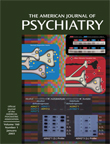Protective Association of Genetic Variation in Alcohol Dehydrogenase With Alcohol Dependence in Native American Mission Indians
Abstract
OBJECTIVE: Two alcohol dehydrogenase genes (ADH2 and ADH3 on chromosome 4) and one aldehyde dehydrogenase gene (ALDH2 on chromosome 12) exhibit functional polymorphisms. The goal of this study was to determine whether any associations exist between the ADH2, ADH3, and ALDH2 polymorphisms and alcohol dependence in a group of Native Americans. An additional goal was to determine if any associations exist between these polymorphisms and the endophenotype, maximum number of drinks ever consumed in a 24-hour period. METHOD: Mission Indian adults (N=340) were recruited for participation from reservations in southern California. Each participant completed an interview with the Semi-Structured Assessment for the Genetics of Alcoholism. A blood sample was collected from each participant for genotyping at the ALDH2, ADH2, and ADH3 loci. RESULTS: Sixty percent of all participants (72% of men and 53% of women) met lifetime DSM-III-R criteria for alcohol dependence. A significant difference in the ADH2 allele distributions was found between alcohol-dependent and non-alcohol-dependent participants. Those with alcohol dependence were significantly less likely to have the ADH2*3 allele (odds ratio=0.28) and significantly more likely to have the ADH2*1 allele (odds ratio=2.00) than those who were not alcohol dependent. Individuals with ADH2*3 reported a lower number of maximum drinks ever consumed in a 24-hour period, compared to those without this allele. CONCLUSIONS: These results are consistent with genetic linkage studies showing protective associations for alcohol dependence and related behavior on chromosome 4 and suggest that ADH2 polymorphisms may account for these findings. These results also highlight the utility of evaluating protective factors in populations with high rates of alcohol dependence.



